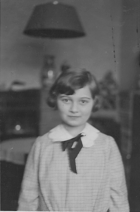Air raids and a Dobosch torte
When the nightly sirens warning us of German planes coming in became too frequent, and our trips to the shelter, at the bottom of a deep metro station, became too scary, Mother decided to close our apartment, put our furniture in storage and move to a hotel. I don’t know what her reasons were, because the air raids were just as frequent in the hotel.
This was on a narrow street across from the Folies Bérgères. It was full of refugees from all over Europe, mostly families or couples. The basement had the remains of a kitchen that might have served a better clientèle in the past, but it was usable. Unfortunately it started constant disputes between the residents, over who was entitled to cook at which burner, when, and for how long. This was a view of sad, endangered people at their worst.
Now and then Mother treated us at a little restaurant for lunch, and one day I had just started on the dessert when the sirens went off. There had been warnings before, often in the night, and nothing serious ever happened. As always, everyone left to head for the shelter… everyone but Mother and I. I refused to leave my dessert, which was my favourite: Dobosch torte, insisting that nothing ever happened, that it was ridiculous to run underground every time the sirens went off, and I wasn’t going to leave a good thing for nothing. Naturally Mother would not leave without me, but she was terribly angry, while I continued calmly eating away at that lovely piece of torte. My mother did not have an easy time with me.
It’s true that Paris had not been bombed: during all the alerts nothing had happened. However, this was the one and only time the bombs did fall, right on the Renault factory on the Seine just outside the city. You can be sure Mother did not fail to remind me of this. However, I did finish the Dobosch torte and never regretted it.
A hotel, and a missed New Year’s Eve
On the street leading to the Folies Bérgères was a row of hotels with rooms-by-the-hour, something which of course I knew nothing about. I did ask Mother: “Why are there always people coming to the hotel entrance, looking left and right, and hurrying in, and why are all the shutters closed?” As usual, she would not explain things to me.
One of the apartments in the hotel was occupied by a beautiful German woman, with a rich, unattractive but accommodating husband, and a handsome lover. They lived together, I suppose amicably. The woman, who looked very much like Marlene Dietrich, had taken a liking to me and wanted to adopt me, but my mother would not hear of it. Towards the end of December, the beautiful woman told me she wanted to take me along to a New Year’s Eve celebration. I was thrilled and ran to ask Mother for approval. However, when she found out that the party was happening at the local bordello, she absolutely refused to have me go. It was quite some time before I ever found out what a ‘bordello’ was. We did meet them again some months later, in Marseilles, but that’s another story.
Leaving Paris, reaching Troyes
By the time Mother had the courage to leave Paris without a Police Permit, the city was darkened by soot from the burning oil in Rouen and the Nazi tanks were entering Paris from the northern gates. Before leaving she gathered all our food coupons and exchanged them for packages of sugar cubes. She had in her mind her experience from WWI, when this was the best – and sometimes the only – currency that could get you anything at all. The packages of sugar were carried in my backpack, and in addition I carried two small suitcases holding a few of our belongings.
When we left the hotel there were three others who went at the same time: an older man with only a small suitcase and a middle-aged couple with quite a bit of luggage. Since we were the only people left, we joined forces and travelled together. It turned out that one case of her luggage contained all her jewellery which was not only heavy but expensive, and her full length fur coat rested on her arm. This is not a good way to flee from danger. Not long after we had set out on the road, by then hot, dusty, tired and thirsty, the beautiful fur coat landed in a ditch. I did not see anyone interested in picking it up, either.
Nothing was running from Paris: no trains, cars, busses; the only way was to keep walking on streets empty of people or vehicles. After an hour or so we saw a small pick-up truck parked in front of a café. Since I was the only one with perfect French I was – as always – delegated to speak for others who might have vaguely German accents and therefore were either ignored or beaten up. I went in and asked whose truck it was and two men spoke up. Politely I inquired whether they could give us a lift and they said OK. We crowded into the open back of the vehicle and off it went. We were delighted, but I had not asked where they were headed and it turned out they were going home, which was Troyes, a city right in the eastern battle lines.
Read the second part of Elly Sherman’s story, War years: heading south
Comment on the story here.
